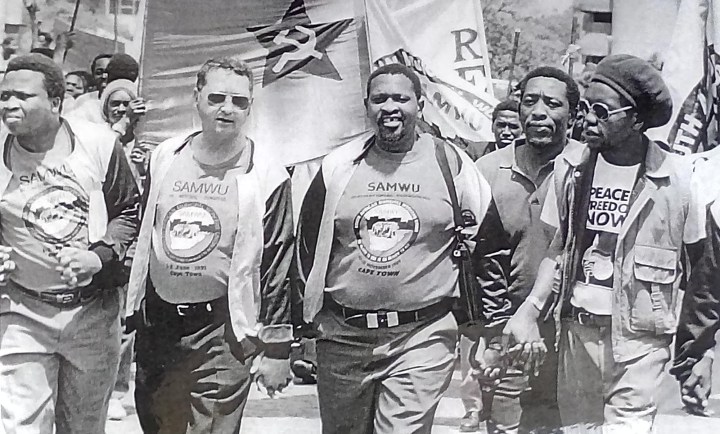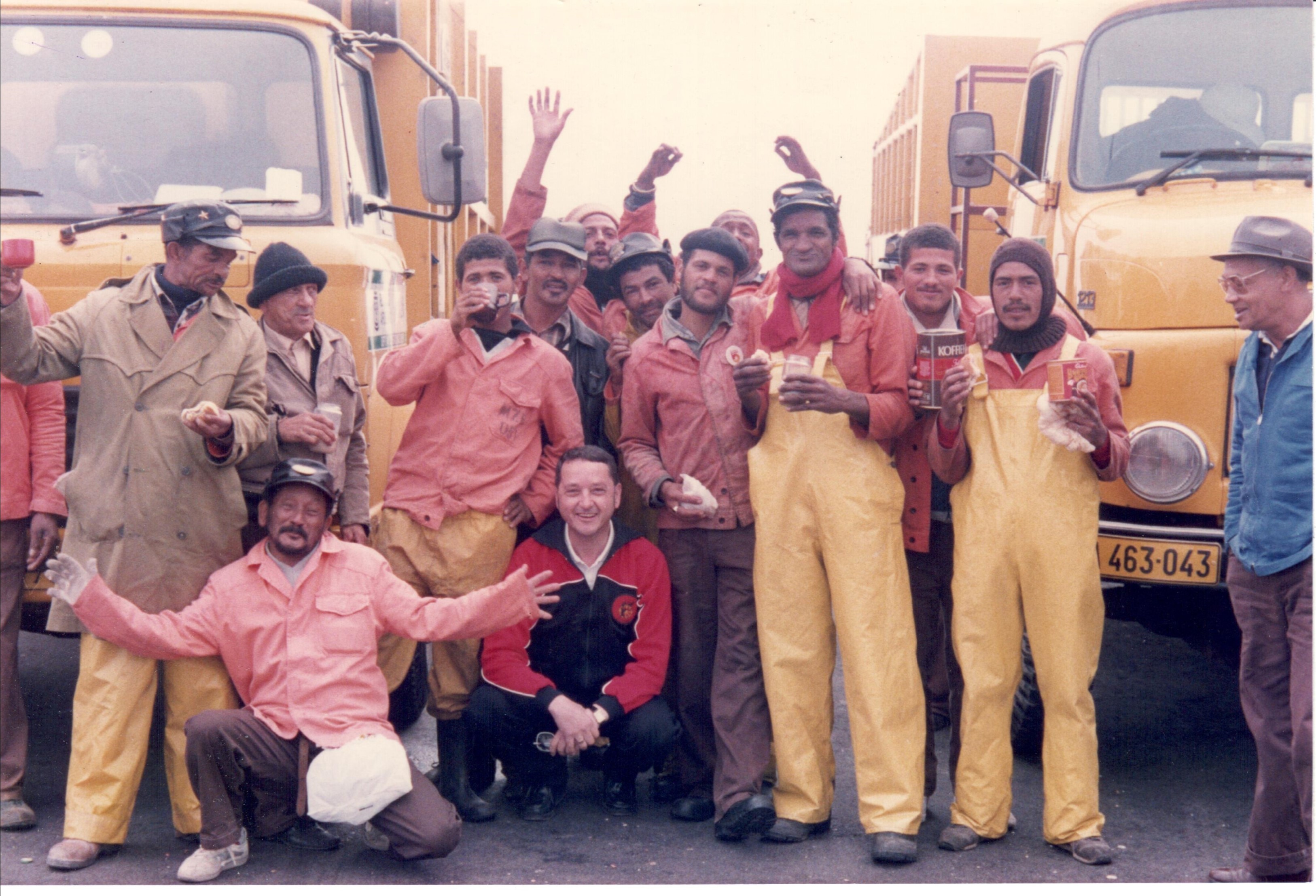TRIBUTE
John Ernstzen’s life of public service, both as a trade unionist and in government

John Ernstzen, one of the most pre-eminent trade unionists in South Africa, has died at the age of 82.
For more than two decades, John Ernstzen headed the Cape Town Municipal Workers’ Association (CTMWA), the largest union in the Western Cape. He was also one of the leaders who steered an often-fractious bunch of unions into one federation, Cosatu, in 1985.
Ernstzen began his union career when he was just 17. Hired as an apprentice by a furniture manufacturer in Woodstock, he joined the furniture workers’ union, and became a shop steward at 18. And he was not quite 21 when he was arrested for industrial sabotage.
The whole factory had gone on strike, demanding higher wages, except for “one white guy” and him. As an apprentice, he was prohibited from striking. Nonetheless, he showed a quiet solidarity with his workmates.
His job was to mix chemicals in a certain combination to thin and dry the paint on the furniture. He changed the ratio to omit the drying agent. “I sprayed and I worked merrily. And they couldn’t sell the furniture because it remained wet.”
It didn’t take the employers long to figure out the culprit. Apart from the “white guy”, he was the only one working.
“That’s when they dragged me down to the Woodstock police station” and threatened to charge him with industrial sabotage.
A few hours later, a young attorney the union had hired arrived at the police station. Abdullah Omar, then 26, was raised in District Six and had graduated with a law degree from the University of Cape Town in 1957. He set up a small practise in the city but because of the Group Areas Act, was forced to move his offices to Woodstock.
“I said to myself: “Wat gaan hierdie laaitie nou vir my doen? (What can this youngster do for me?).” But Omar just “sauntered in” and got him released.
For Ernstzen it was the beginning of a lifelong friendship with the late lawyer who would become the first minister of justice in the democratic government. It was also the beginning of his immersion in the trade union movement, which would become a critical force in the Struggle against apartheid.
Although he escaped prosecution, Ernstzen was fired. He found a job a few months later at another furniture factory, but the chemicals in the paint had damaged his eyes. He ended up in hospital and “that was the end of my wood-working days. I was told not to get back into that environment”.

Cape Town Municipal Workers’ Association’s John Ernstzen (centre) during a protest by refuse workers, exact date unknown Photo: Merle Brown)
Visit Daily Maverick’s home page for more news, analysis and investigations
Born on 10 August 1940, the youngest of four sons, he was raised in a rental home in Buitengracht Street on the edge of Bo-Kaap. His father, for whom he is named, suffered from chronic asthma and was unable to work. He died in 1955 when Ernstzen was just 15. His mother, Florence, worked in a garment factory by day and for tailors by night.
“I can still see those fingers going and going … She provided for us.”
When he was in his teens, the family moved to Woodstock. He was one of the first intakes at Harold Cressy, a school named after the first black graduate of UCT. It had a formidable reputation for education, despite the efforts of the apartheid government to downgrade “coloured” education.
Although he had a bursary until matric, he left school with a Junior Certificate (the equivalent of Grade 10) to help his mother.
This was before the Group Areas Act wrought its destruction on coloured communities in the Cape. That his home was close to an industrial area was key in finding his first job. He’d walked the streets for a “heartbreaking” eight months trying to find work. A breakthrough came when a friend rushed over from the nearby furniture factory and told him if he came immediately, he could get an apprenticeship.
After his “wood-working” days ended, he joined the City Council’s Parks and Forestry department as an attendant in a playground in Schotsche’s Kloof. Local gangs harassed him: one day after he had confronted them about smoking dagga in the park, he arrived to find the park gates and locks soiled with urine and faeces. He marched down to the council offices in Queen Victoria Street, flung the keys at his supervisors, asking whether they would allow their children to work in such circumstances.
He walked out, expecting to be fired. Instead, an official followed him up Wale Street, calmed him, and offered him a post in the Newlands Forestry department.
It was here he began to organise his fellow workers – clerks who, because they were coloured, were called “clerical assistants”. The union was a closed shop – employees had to join – and was more of a benefit society, he recalled, but he was elected as a shop steward.
The starting time of the coloured clerks was 7.18am – an oddity in the bureaucracy’s attempt to calculate a precise 46-hour working week, so they called themselves the “7.18s”. Their major grievance was the pay gap between the white clerks and the “clerical assistants”, who did the same work.
One Monday morning in 1963 the “7.18s” downed pens.
“And for a few months council was in turmoil because … there was no one to compile their timesheets, there was no one doing roll call. There was no one booking overtime.” The council, he said, got its first taste of revolt.
Through Dullah Omar, he had become involved in the “Non-European Unity Movement”, a grouping of prominent intellectuals who fiercely opposed apartheid, but whose stance of “non-collaboration” meant they eschewed most activism.
Although his politics changed considerably by the mid-1980s, it was this initial influence that spurred him and his allies to take over what had been a “sweetheart” union.
Ernstzen’s group ousted the incumbents in a contest sometimes marked by violence, and in 1964, a caretaker committee was formed. In 1968, he was elected general secretary of the now re-formed Cape Town Municipal Workers’ Union. He was to lead the union for the next three decades.
In 1981, Ernstzen, with other prominent unionists, such as David Lewis – then of the General Workers’ Union (later of Corruption Watch) – and Joe Foster of Fosatu, forged a fragile unity between unions, ranging from the “workerists” to the “populists”, in what became known as the Langa talks. This was the precursor to the formation of Cosatu in 1985.
In line with Cosatu’s “one industry, one union” policy, municipal unions around the country merged to form the South African Municipal Workers’ Union, Samwu. About two-thirds of its then 60,000 members came from the CTMWA.
Roger Ronnie, who succeeded Ernstzen as general secretary of Samwu in 1994, said Ernstzen’s strength was that his political background enabled him “to lead workers into Cosatu”. But he was also able to “move beyond the confines imposed by that background”.
More pertinently, the CTMWA was the biggest Cosatu affiliate from the Western Cape, and Samwu, says Ronnie, was the best-administered union in the federation. In 1990, it also led the biggest strike ever of municipal workers in the Western Cape. It lasted two weeks and involved 10,000 workers.
“The effects of the strike were dramatic,” writes Lesley Catchpowle in a 2002 master’s thesis. From the traffic department to rents’ offices to the abattoirs, 90% of workers stayed away.
After 1994, Ernstzen continued a life of public service, first as adviser to Zola Skweyiya, then Minister of Public Service and Administration, and later as deputy chair of the Public Service Commission (PSC).
Geraldine Fraser-Moleketi, who succeeded Skweyiya as minister, said Ernstzen played a key role in creating a single public service out of the myriad administrations that prevailed under apartheid.
“It was setting up institutions in such a manner that they would be enduring for the future, but also able to deal with the past.”
She bemoans the fact that today there is “a sense of major dysfunction across the public service”, despite the role the PSC is supposed to play.
While he was a commissioner, Ernstzen lost his first wife Kathleen, and his only son, John, to cancer. He himself died from cancer this week at his home in Heathfield, Cape Town.
He is survived by his second wife, Val. DM
The writer acknowledges a 2014 interview with Ernstzen by Tony Ruiters and Rustum Omar, as well as an unpublished history of the union by John Mawbey. She conducted several interviews with Ernstzen in 2016/2017.
Veteran journalist and former South African Press Ombud Pippa Green edits Econ3x3, an online economic policy newsletter based at the Southern African Labour and Development Research Unit (Saldru) at the University of Cape Town.



















 Become an Insider
Become an Insider
Comments - Please login in order to comment.